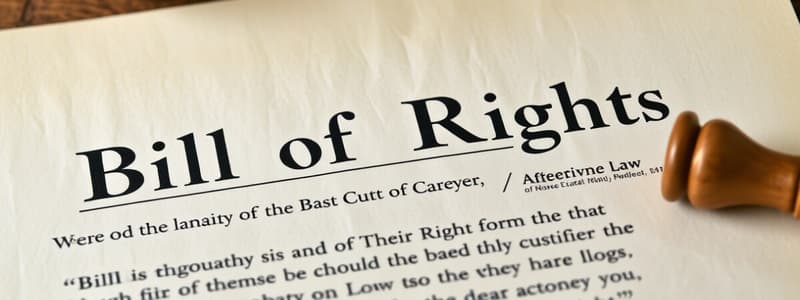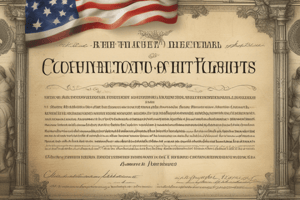Podcast
Questions and Answers
What are amendments?
What are amendments?
Changes or additions to a legal document, especially the Constitution.
What does Amendment 1 guarantee?
What does Amendment 1 guarantee?
- Freedom of the press, speech, & religion (correct)
- Right to a speedy trial
- Right to bear arms
- Freedom of assembly
What is protected by Amendment 2?
What is protected by Amendment 2?
- The right to bear arms and form militias (correct)
- Right to a fair trial
- Protection against unreasonable searches
- Freedom of speech
Amendment 3 allows soldiers to stay in private homes during peacetime.
Amendment 3 allows soldiers to stay in private homes during peacetime.
Which amendment addresses search and seizure?
Which amendment addresses search and seizure?
What rights does Amendment 5 guarantee?
What rights does Amendment 5 guarantee?
What does Amendment 6 guarantee?
What does Amendment 6 guarantee?
What is the financial threshold for a jury trial in Amendment 7?
What is the financial threshold for a jury trial in Amendment 7?
Amendment 8 allows for cruel and unusual punishments.
Amendment 8 allows for cruel and unusual punishments.
What does Amendment 9 state about personal rights?
What does Amendment 9 state about personal rights?
What principle is established by Amendment 10?
What principle is established by Amendment 10?
Flashcards
What are amendments?
What are amendments?
Changes or additions to a legal document, especially the Constitution.
Amendment 1 guarantee?
Amendment 1 guarantee?
Freedom of the press, speech, and religion.
Protected by Amendment 2?
Protected by Amendment 2?
The right to bear arms and form militias.
Which amendment addresses search and seizure?
Which amendment addresses search and seizure?
Signup and view all the flashcards
Amendment 5 guarantee?
Amendment 5 guarantee?
Signup and view all the flashcards
Amendment 6 guarantee?
Amendment 6 guarantee?
Signup and view all the flashcards
Amendment 9 state about personal rights?
Amendment 9 state about personal rights?
Signup and view all the flashcards
Principle is established by Amendment 10?
Principle is established by Amendment 10?
Signup and view all the flashcards
Study Notes
Amendments Overview
- Amendments are formal changes or additions to the Constitution, specifically the first ten being known as the Bill of Rights.
Amendment 1
- Guarantees freedoms including speech, press, and religion, allowing individuals to express themselves without government interference.
Amendment 2
- Recognizes the right to bear arms and allows for the formation of militias, emphasizing the importance of self-defense.
Amendment 3
- Prohibits the quartering of soldiers in private homes during peacetime without the homeowner’s consent; provides specific limitations during wartime.
Amendment 4
- Protects against unreasonable searches and seizures; requires law enforcement to obtain a search warrant based on probable cause.
Amendment 5
- Ensures the right to remain silent to avoid self-incrimination; prohibits double jeopardy, and establishes due process of law.
Amendment 6
- Guarantees the right to an attorney and a speedy, public trial by an impartial jury; ensures that defendants are informed of the charges against them.
Amendment 7
- Affirms the right to a jury trial in civil cases where the amount in controversy exceeds twenty dollars.
Amendment 8
- Protects against excessive bail and prohibits cruel and unusual punishment for those accused of crimes.
Amendment 9
- Asserts that the enumeration of certain rights in the Constitution does not deny or disparage other rights retained by the people.
Amendment 10
- Reserves powers not delegated to the federal government by the Constitution to the states or the people, emphasizing state rights.
Studying That Suits You
Use AI to generate personalized quizzes and flashcards to suit your learning preferences.




